#housing market inequality
Text
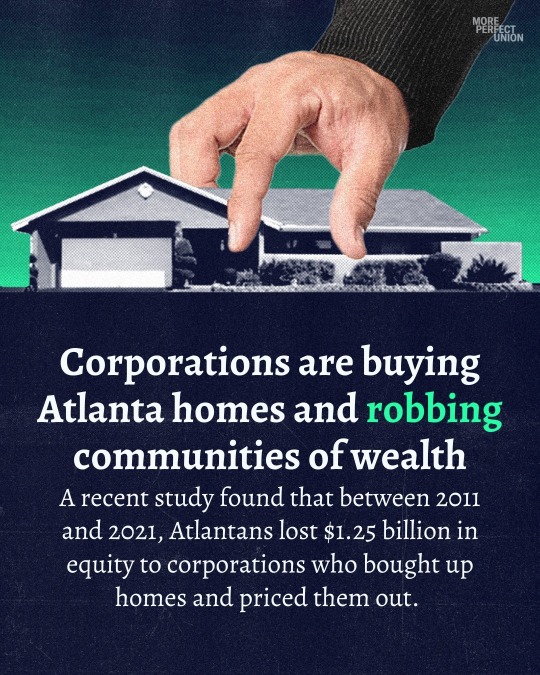
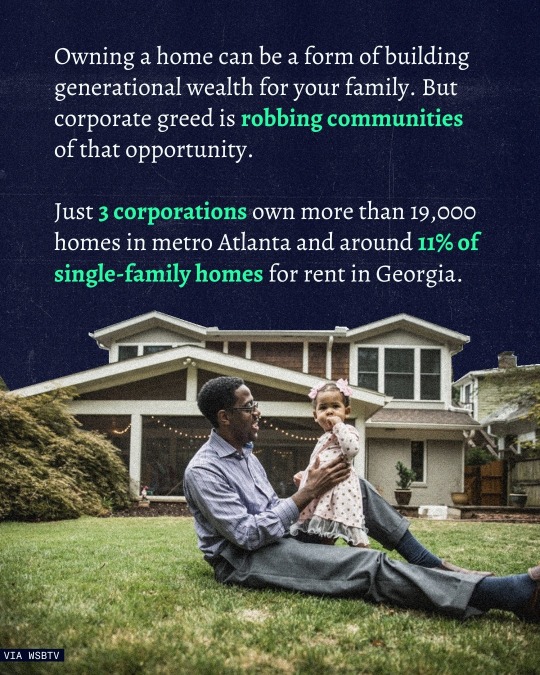
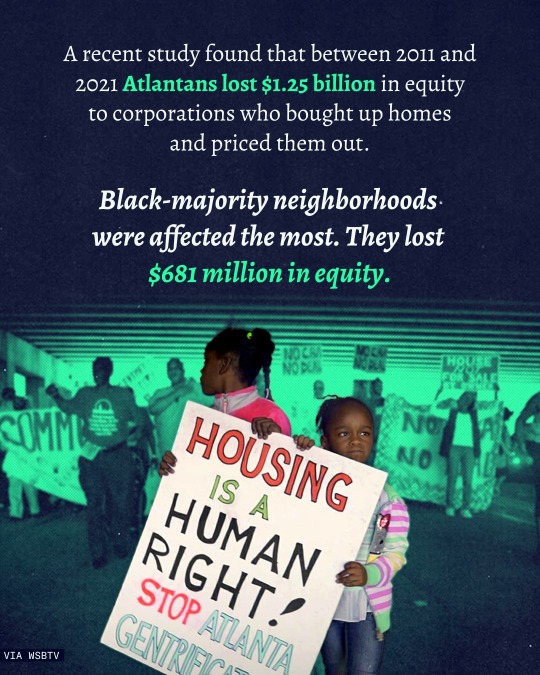
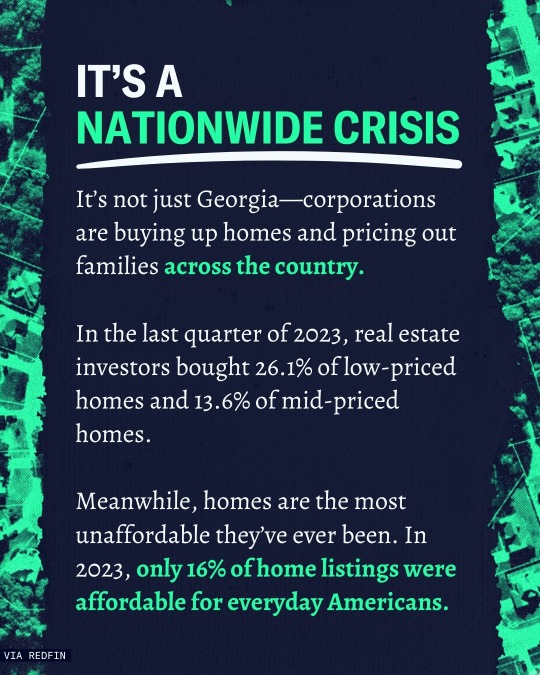
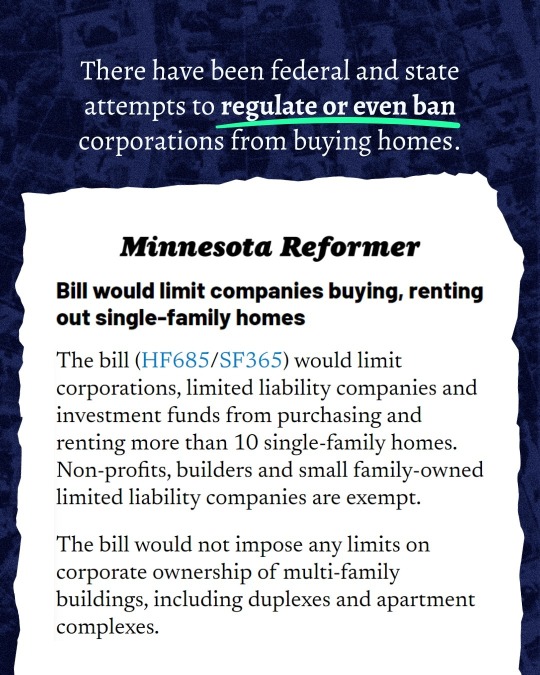
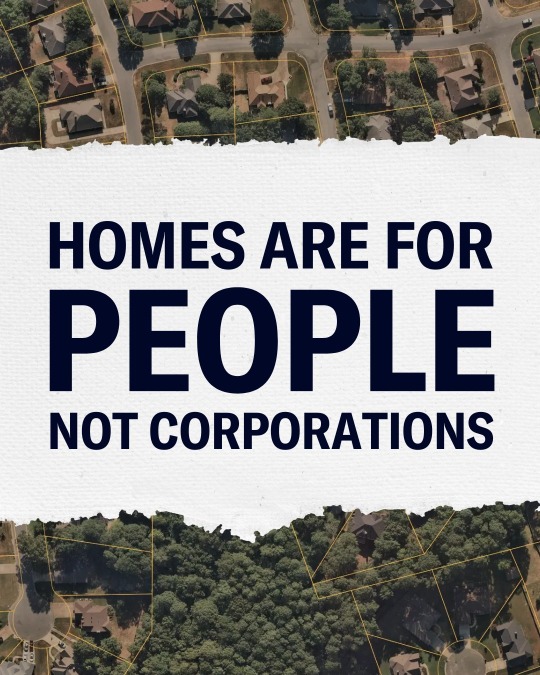
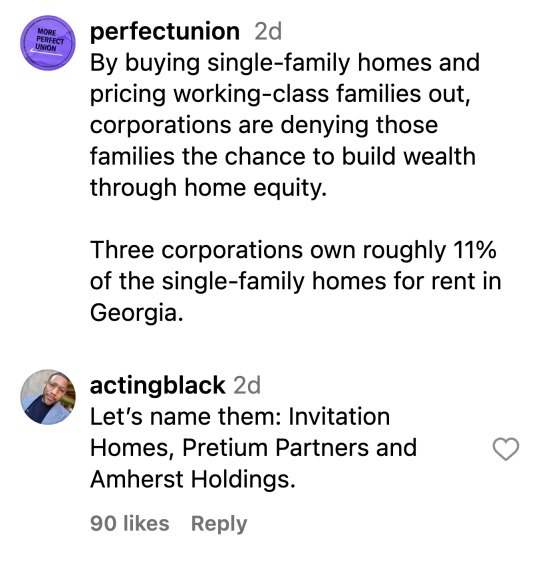
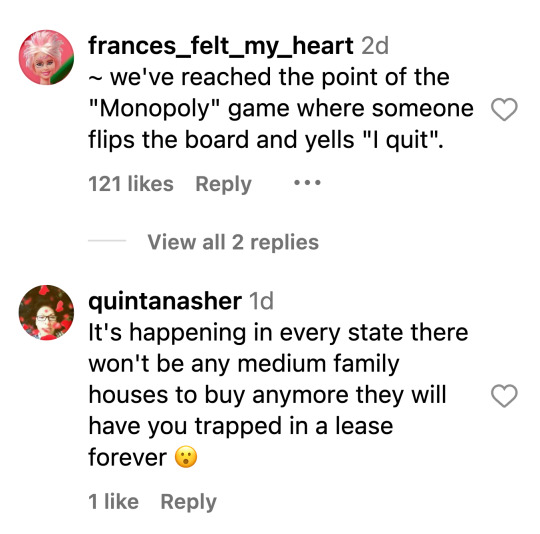
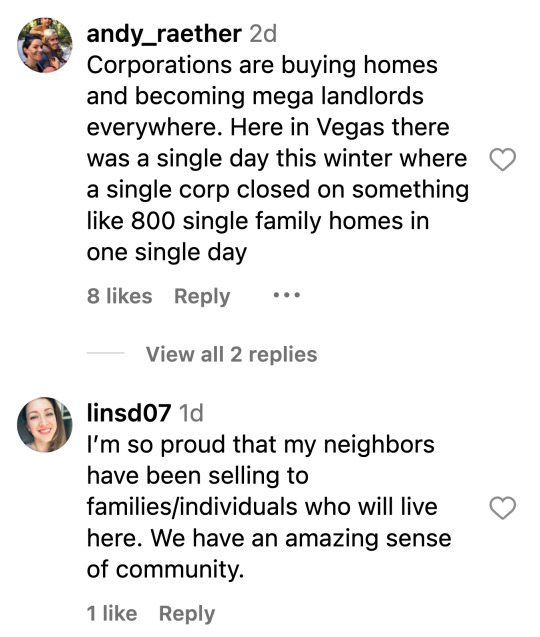
#housing inequality#corporate ownership#home equity#affordable housing#real estate market#wealth disparity#housing crisis#single-family homes#working-class families#corporate landlords#Georgia housing market#property investment#economic disparity#housing affordability#rental market#housing market inequality#corporate real estate#wealth gap#homeownership barriers#housing investment#financial disparity#real estate monopoly#housing affordability crisis#rental housing#economic inequality#property ownership#housing accessibility#corporate influence#affordable homeownership#investment firms in real estate
1K notes
·
View notes
Video
undefined
tumblr
Solutions to the current housing market problems.
#tiktok#housing crash#housing crisis#housing market#affordable housing#housing#crime#income inequality#wealth inequality#inequality#hoarding wealth#wealth gap#generational wealth#wealth#public transportation#public transport#public transit#economy#economics#child poverty#poverty
121 notes
·
View notes
Text
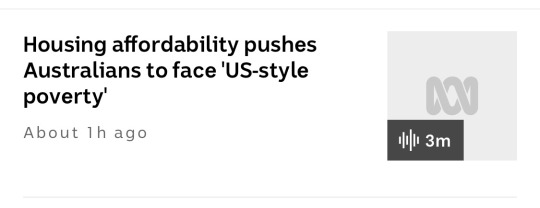
Just so you’re all aware, Australia’s news outlets use “US-style” as an adjective to describe extreme poverty.
That’s all.
#dystopian present#inequality#homelessness#housing crisis#rich and poor#housing#property market#australia#Australia and US#USA#US-style
17 notes
·
View notes
Text

Arizona, Nevada and California Dream
Californians are leaving California because housing is terribly expensive, and beggary and poverty are everywhere on the streets. Inequality is toxic: the state has the most billionaires and the most homeless people in the US.
Tens of thousands of residents of Nevada and Arizona are seeing their housing prices soar as a result of the arrival of these Californians, and are being displaced outside the cities.
California’s housing crisis is spreading to neighboring states — and could sway their voters – Los Angeles Times: https://www.latimes.com/california/newsletter/2024-04-10/californias-housing-crisis-is-spreading-to-its-neighbors-essential-california
Arizona and Nevada see their natural water resources captured by industrial farms in Southern California. Colorado water unions sell water rights to California farmers. Water is too expensive for the inhabitants of these states.
Let’s talk about the biggest cause of the West’s water crisis. The Colorado River is going dry … to feed cows. – Vox: https://www.vox.com/the-highlight/23655640/colorado-river-water-alfalfa-dairy-beef-meat
Housing and water are human rights necessities. This situation is unacceptable and is creating legitimate anger among the people of Arizona and Nevada.
When Donald Trump was president, he did nothing to change the situation. He’s more concerned with his own personal interests and those of Vladimir Putin.
California is governed by a Democrat, Gavin Newson. Kamala Harris is a Californian and former Attorney General of California. They should do more.
Housing and water prices should not be left to the market. Prices should be controlled, as Kamala Harris proposes.
We can hope that Harris, who comes from a modest background, understands the situation of these people more than Trump, who is a billionaire.
The Biden-Harris administration has already agreed to begin ceding federal lands to Nevada.
Let’s not forget that California became prosperous thanks to huge public investments, paid for by American taxpayers. For example, Nasa’s Jet Propulsion Laboratory financed all the major technology companies in the 1950s and 1960s, when Silicon Valley was still just farmland with almond groves.
We need to give power back to the people, so that public services and redistribution are available to all.
Translated with DeepL.com (free version)
---------------------------------------------------------------------------
Arizona, Nevada et California Dream: https://www.aurianneor.org/california-dream/
Arizona, Nevada y California Dream: https://www.aurianneor.org/arizona-nevada-y-california-dream/
We’re all in it together: https://www.aurianneor.org/were-all-in-it-together/
Housing: https://www.aurianneor.org/housing/
Price ceilings and price floors: https://www.aurianneor.org/price-ceilings-and-price-floors/
Only two candidates to choose from: https://www.aurianneor.org/only-two-candidates-to-choose-from/
To give or not to give?: https://www.aurianneor.org/to-give-or-not-to-give-give-or-not-give-giving/
Protecting water: https://www.aurianneor.org/protecting-water/
Humiliated by the Republic: https://www.aurianneor.org/humiliated-by-the-republic/
Will you get what you expect from Trump? Chaos is unpredictable: https://www.aurianneor.org/will-you-get-what-you-expect-from-trump-chaos-is-unpredictable/
Who backs the US military?: https://www.aurianneor.org/who-backs-the-us-military/
A slice of the cake: https://www.aurianneor.org/a-slice-of-the-cake/
#Arizona#aurianneor#billionaires#California#democracy#donald trump#economy#farms#Gavin Newson#housing#human rights#inequality#Kamala Harris#market#Nevada#poutine#poverty#united states#usa#water
1 note
·
View note
Text
Salaried is just another word for full time slave. All your time is their time.
Hourly full time is just another word for exclusive part time slave because for 10 hours of your life 5 days a week or whatever you belongs to them.
If you are part time, you are a full time slave with uncertain pay because all your time still belongs to them because they keep jerking you around and they always fuck up your hours.
But they aren't slaves. Nobody owns them. They can go with somewhere else if they must. Nobody is holding a gun to their head.
Well, that is all true. But if chattel slavery is the only thing that counts as slavery to you then you need to open your eyes, man.
Using someone's poverty against them to take shitty pay for shitty working conditions where you do whatever they tell you or lose your kids doctors food and shelter and join the growing masses of unhoused.
Sounds even worse than putting a gun to my head. Have you seen how we treat homeless people? They have to huddle in the corners and alleys and vacant buildings and bridge underpasses breathing the exhaust of our cars on every street and feeling our scorn everywhere.
We won't even let them duck in to shit in any store like you or I can. They have to shit in the street and get filmed for Fox News.
#capitalism is predicated on making on using your power and wealth inequalities to force others to take bad deals#capitalism is predicating on making other people lose as much as you can#It's the only way to compete because everyone else is doing it too#if capitalism were about free markets I could afford a house and my daughter would have quality health insurance#capitalism is a religion#capitalism is the worship of money and theft and murder#poverty kills#we cant get healthcare and we are way overstressed and have no local in-person support networks#All my friends are virtual#and my rent is far more than half my pay.#and I'm getting a discounted rate from a board member#who voted to not give me a raise after 11% inflation#and she raised my rent#fuck Capitalism#drowningworms blog
0 notes
Text
Salaried is just another word for full time slave. All your time is their time.
Hourly full time is just another word for exclusive part time slave because for 10 hours of your life 5 days a week or whatever you belongs to them.
If you are part time, you are a full time slave with uncertain pay because all your time still belongs to them because they keep jerking you around and they always fuck up your hours.
But they aren't slaves. Nobody owns them. They can go with somewhere else if they must. Nobody is holding a gun to their head.
Well, that is all true. But if chattel slavery is the only thing that counts as slavery to you then you need to open your eyes, man.
Using someone's poverty against them to take shitty pay for shitty working conditions where you do whatever they tell you or lose your kids doctors food and shelter and join the growing masses of unhoused.
Sounds even worse than putting a gun to my head. Have you seen how we treat homeless people? They have to huddle in the corners and alleys and vacant buildings and bridge underpasses breathing the exhaust of our cars on every street and feeling our scorn everywhere.
We won't even let them duck in to shit in any store like you or I can. They have to shit in the street and get filmed for Fox News.
#capitalism is based on making other people lose#it is about using power and wealth inequalities to constrict options and competition and maximize profits in any way possible#in a free market houses would be affordable
0 notes
Text

Article | Paywall Free
"Maryland Gov. Wes Moore issued a mass pardon of more than 175,000 marijuana convictions Monday morning [June 17, 2024], one of the nation’s most sweeping acts of clemency involving a drug now in widespread recreational use.
The pardons forgive low-level marijuana possession charges for an estimated 100,000 people in what the Democratic governor said is a step to heal decades of social and economic injustice that disproportionately harms Black and Brown people. Moore noted criminal records have been used to deny housing, employment and education, holding people and their families back long after their sentences have been served.
[Note: If you're wondering how 175,000 convictions were pardoned but only 100,000 people are benefiting, it's because there are often multiple convictions per person.]
A Sweeping Act
“We aren’t nibbling around the edges. We are taking actions that are intentional, that are sweeping and unapologetic,” Moore said at an Annapolis event interrupted three times by standing ovations. “Policymaking is powerful. And if you look at the past, you see how policies have been intentionally deployed to hold back entire communities.”
Moore called the scope of his pardons “the most far-reaching and aggressive” executive action among officials nationwide who have sought to unwind criminal justice inequities with the growing legalization of marijuana. Nine other states and multiple cities have pardoned hundreds of thousands of old marijuana convictions in recent years, according to the National Organization for the Reform of Marijuana Laws. Legalized marijuana markets reap billions in revenue for state governments each year, and polls show public sentiment on the drug has also turned — with more people both embracing cannabis use and repudiating racial disparities exacerbated by the War on Drugs.
The pardons, timed to coincide with Wednesday’s Juneteenth holiday, a day that has come to symbolize the end of slavery in the United States, come from a rising star in the Democratic Party and the lone Black governor of a U.S. state whose ascent is built on the promise to “leave no one behind.”
The Pardons and Demographics
Derek Liggins, 57, will be among those pardoned Monday, more than 16 years after his last day in prison for possessing and dealing marijuana in the late 1990s. Despite working hard to build a new life after serving time, Liggins said he still loses out on job opportunities and potential income.
“You can’t hold people accountable for possession of marijuana when you’ve got a dispensary on almost every corner,” he said.
Nationwide, according to the ACLU, Black people were more than three times more likely than White people to be arrested for marijuana possession. President Biden in 2022 issued a mass pardon of federal marijuana convictions — a reprieve for roughly 6,500 people — and urged governors to follow suit in states, where the vast majority of marijuana prosecutions take place.
Maryland’s pardon action rivals only Massachusetts, where the governor and an executive council together issued a blanket pardon in March expected to affect hundreds of thousands of people.
But Moore’s pardons appear to stand alone in the impact to communities of color in a state known for having one of the nation’s worst records for disproportionately incarcerating Black people for any crimes. More than 70 percent of the state’s male incarcerated population is Black, according to state data, more than double their proportion in society.
In announcing the pardons, he directly addressed how policies in Maryland and nationwide have systematically held back people of color — through incarceration and restricted access to jobs and housing...
Maryland, the most diverse state on the East Coast, has a dramatically higher concentration of Black people compared with other states that have issued broad pardons for marijuana: 33 percent of Maryland’s population is Black, while the next highest is Illinois, with 15 percent...
Reducing the state’s mass incarceration disparity has been a chief goal of Moore, Brown and Maryland Public Defender Natasha Dartigue, who are all the first Black people to hold their offices in the state. Brown and Dartigue have launched a prosecutor-defender partnership to study the “the entire continuum of the criminal system,” from stops with law enforcement to reentry, trying to detect all junctures where discretion or bias could influence how justice is applied, and ultimately reform it.
How It Will Work
Maryland officials said the pardons, which would also apply to people who are dead, will not result in releasing anyone from incarceration because none are imprisoned. Misdemeanor cannabis charges yield short sentences and prosecutions for misdemeanor criminal possession have stopped, as possessing small amounts of the drug is legal statewide.
Moore’s pardon action will automatically forgive every misdemeanor marijuana possession charge the Maryland judiciary could locate in the state’s electronic court records system, along with every misdemeanor paraphernalia charge tied to use or possession of marijuana. Maryland is the only state to pardon such paraphernalia charges, state officials said...
People who benefit from the mass pardon will see the charges marked in state court records within two weeks, and they will be eliminated from criminal background check databases within 10 months."
-via The Washington Post, June 17, 2024. Headings added by me.
#maryland#united states#us politics#cannabis#cannabis community#marijuana#pot#wes moore#democrats#voting matters#mass incarceration#prison#prison industrial complex#racism#discrimination#oppression#policing#social issues#pardons#legal system#background checks#prison system#good news#hope
1K notes
·
View notes
Text
Ticketmaster jacks us for billions so it can pocket millions
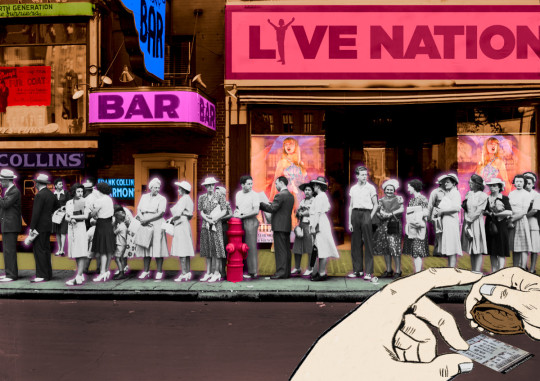
NEXT WEEKEND (June 7–9), I'm in AMHERST, NEW YORK to keynote the 25th Annual Media Ecology Association Convention and accept the Neil Postman Award for Career Achievement in Public Intellectual Activity.

Corruption is a system of concentrated gains and diffused costs: cheaters make a lot of money, and their victims each lose a little. The cheater has a much larger pool of money to spend on keeping the scam going, and the victims need to pay again to fight the cheater.
Actually, it's worse. The victim pays once when they are cheated, then, they pay a second time (in time and/or money) when they fight back against the cheater.
But in order to fight back effectively, the victims need to band together – it doesn't make sense for one victim to pony up to counter the cheater, because the cheater stole from a lot of people and can therefore spend far more than the victim lost and still come out ahead.
This is the third time the victim pays: they pay the "collective action" tax of locating other victims, agreeing to a common strategy for fighting back, and then coordinating with all those co-victims to keep the campaign up.
But actually, it's even worse. Because most corruption isn't just dishonest, it's incredibly wasteful. Corruption involves stealing ten dollars from you to make a dime for the cheater. The polluter who gives you cancer rather than cleaning up their industrial process costs you millions in medical bills – and maybe costs your family the lifelong trauma and expense of living with your death. They pocket an infinitesimal fraction of those costs. The rest is just wasted. They're setting your house on fire to spare themselves the cost of a match to light their cigar.
This is yet another way in which the deck is stacked in favor of corruption. A victim of corruption is placed in a condition of precarity and misery from which is it difficult to marshal a counteroffensive. The cheater, meanwhile, is made stronger and more comfortable by their corrupt activities. Immiserated victims must undertake the hard, ongoing work of acting together to be effective against the cheater. The cheater answers only to themself, avoiding the collective action costs that the victims pay every time they seek to act.
All of this is why we have governments. A government is (said to be) a democratically accountable way to meet the concentrated power of the corrupt with the concentrated power of the victims of corruption. Governments are many things, but they are especially a way of solving the collective action problem of enforcing the rules against cheaters. This is partially in service to justice – no one likes to be cheated, and a society of rampant and routine cheating is unstable and prone to collapse.
But it's also a matter of efficiency. While it makes a certain kind of selfish sense for the cheater to liquidate our dollar to make their penny, from a societal perspective, it's a catastrophe. Letting Wall Street slumlords corner regional markets in single family dwellings makes large amounts of money for their investors, but it costs those cities unimaginable amounts in public services as their housing stock decays, homelessness spikes, and schools and public services crumble for want of local taxes.
The paltry sums that Flint's creditors extracted by insisting on switching to a chlorinated water-supply that leeched lead out of the city's water infrastructure are crumbs compared to the vast, lifelong costs of giving an all the children in a city lead poisoning, to say nothing of the costs to the city as a city nor forever tainted by this unspeakably evil crime.
This is why inequality – and its handmaiden, monopoly – is so dangerous. The more concentrated private wealth becomes, the harder it is for the state to police, and the more likely it is that this private wealth will corrupt our officials. We see this all around us – for example, when Supreme Court justices receive lavish gifts from billionaires whom they later rule in favor of:
https://pluralistic.net/2023/04/06/clarence-thomas/#harlan-crow
Through the neoliberal era – the past forty years of billionaire-friendly Reaganomics – we've seen increasing concentration in wealth, coupled to increasing collusion between the wealthy and the government to protect the corrupt against the public. Think of the IRS's long decay, in which it turned a blind eye to increasingly blatant tax evasion by the ultra-wealthy, while training its fire on working people who fudge a few bucks on their returns:
https://pluralistic.net/2022/04/13/taxes-are-for-the-little-people/#leona-helmsley-2022
Likewise, think of the governmental obsession with "welfare cheats," no matter what the cost to families who are kicked off food stamps and Medicaid:
https://armandalegshow.com/episode/medicaid-enrollment/
All this in the midst of a corporate crime-wave that is not only unpunished, it's utterly unremarked-upon:
https://pluralistic.net/2021/12/07/solar-panel-for-a-sex-machine/#a-single-proposition
This emphasis on benefits cheating and indifference to corporate crime really highlights the drag that corruption places on a society's efficiency. Even if you believe that there's a lot of welfare fraud (there isn't!), the dollar in "undeserved" food stamps spent by a cheater costs society…a dollar. Meanwhile the dollar that a corporate criminal makes by skimping on workplace safety costs society thousands of dollars to care for the worker who is then maimed on the job.
This is very easy to see in the world of corporate environmental crime. The "social cost of carbon" measures the total cost of pollution: the injuries caused by marinating in fossil fuel extraction, processing and combustion byproducts; as well as the loss of life and property from climate events. These costs are blistering, so high that every MWh of renewable power we bring online saves us $100 in social carbon costs:
https://pluralistic.net/2024/05/30/posiwid/#social-cost-of-carbon
Governments that sleep on corporate crime are objectively governing badly. That's why the antitrust failures of every US presidential administration from Carter to Trump are so damning: they set the stage for later corruption that would not only be carried out on a larger scale than smaller firms could accomplish, but also for those large firms to corrupt the political process.
This is the Ticketmaster story. The superpredator that is today's Ticketmaster is the end-point of a series of ever-more corrupt mergers, waved through by every-more pliable presidential administrations. It was bad enough when Bush I allowed Ticketmaster to gobble up Ticketron in 1990. After all, the company had already proven itself to be a cesspit of corrupt, bullying activity.
The Ticketron acquisition kicked off a two-decade-long corporate crime-spree that produced a mountain of evidence proving Ticketmaster's nature as an inherently corrupt enterprise that acquired power for the purpose of abusing that power, at the expense of creative workers, the public, and the owners of venues:
https://www.rollingstone.com/music/music-news/pearl-jam-taking-on-ticketmaster-67440/
Despite this, the Obama administration waved through an acquisition that was obviously far more dangerous that the Ticketron caper: the 2010 merger between Ticketmaster and the concert promoter Live Nation:
https://en.wikipedia.org/wiki/Live_Nation_Entertainment#History
After a decade and a half of vertical monopoly power – Ticketmaster/Live Nation controlling ticketing, promotion and venues – the company has grown from a dangerous octopus with its tentacles twined around the industry into a kraken that is strangling every kind of live event and everyone who earns a living from them. This has produced an ever-more obvious string of scandals, most notably the company's assault on Swifties:
https://pluralistic.net/2022/11/20/anything-that-cant-go-on-forever-will-eventually-stop/
A combination of mounting public outrage (with Swifties at the vanguard) and the Biden administration's generational enthusiasm for smashing corporate power has led, at last, to a reckoning with the Ticketmaster kraken:
https://pluralistic.net/2024/04/30/nix-fix-the-tix/#something-must-be-done-there-we-did-something
Ticketmaster is a famously opaque organization. When Rebecca Giblin and I were working on Chokepoint Capitalism, our book on monopoly and creative labor markets, we were able to speak on the record to insiders from every part of the industry, except live performance:
https://chokepointcapitalism.com/
As soon as we raised Ticketmaster/Live Nation with club owners and other events industry insiders, they'd go pale and quiet and tell us that they didn't feel comfortable staying on the record. TM/LN has a well-deserved mafia-style reputation for savage retaliation against snitches.
With the DOJ Antitrust Division chasing Ticketmaster through the courts, we're starting to get a rare, on-the-record glimpse of TM/LN's operations, as its internal documents find their pay into court records. In response Ticketmaster's spokesliars have embarked on an epic spin campaign, to "contextualize" these damning numbers and paint the company as a weak, low-margin business that has been unfairly set-upon by the bullies at the DOJ.
In his BIG newsletter, Matt Stoller offers a spectacular, must-read breakdown of these documents and the ensuing spin:
https://www.thebignewsletter.com/p/is-ticketmaster-telling-the-truth
Stoller starts with Ticketmaster's insistence that it is barely profitable. Though this is true on paper, the numbers just don't add up. For one thing, anyone who's bought a ticket can see, printed on its face, TM's junk fees: "a 'service fee' without any obvious service [and] a 'convenience fee' that is anything but convenient."
Far more damning is a comparison between the price of a Ticketmaster ticket in the US vs the EU. The EU has legally mandated competitive ticketing, and the tickets there are far cheaper. A US ticket to see Taylor Swift will run you $2,600 – the same ticket costs $340 in the EU. As Stoller writes:
An American could fly to Paris, spend a few nights at a nice hotel, see a Taylor Swift concert, and fly back, for less than it costs to see that same show in the U.S.
How to make sense of this contradiction? How can Ticketmaster show such a low profit margin on its books but somehow end up costing event-goers such an absurd premium?
Start with the fact that Ticketmaster has three businesses, not just one. They sell tickets, but they also promote concerts (that is, front the money for personnel, travel and marketing), and they also own a bunch of the largest and most profitable venues in the country.
This allows them to play a shell-game that's very similar to (and possibly not actually different from) money-laundering, where money is shuffled between entities in order to shield it from creditors, suppliers or tax agents:
https://www.thebignewsletter.com/p/explosive-new-documents-unearthed
But this presents a problem for Ticketmaster. They're a publicly traded company and their investors demand high returns. And unlike performers or venue owners, investors have power over Ticketmaster management. Keeping "margin per ticket" number as low as possible lets Ticketmaster minimize the revenue it has to share with the people who actually do the work and invest the capital in live performances. But for investors, they need to show another number, one that's as high as possible, to keep the investors happy.
That number is "Adjusted Operating Income" or AOI. While gross margins are the difference between the face value of a ticket and the sum remitted to the venue and the performer, AOI factors in all the other revenue TM/LN books from that ticket, like kickbacks. TM/LN's AOI is very healthy: it's 37% on tickets and 61% on promotions.
Those sums delight TM/LN's investors, and they express their joy through lavish executive compensation packages. CEO Michael Rapino is America's fifth-highest paid CEO, at $139m/year (that's eight times the Fortune 500 average). His sidekick Joe Berchtold is America's highest paid CFO, at $54m. The total AOI for TM/LN is $732m/year – and 19% of that is being paid to two of its execs.
But LN/TM has a third line of business: operating venues. The AOI for these venues is just 1.7%. If this were a normal, cutthroat business, you'd expect those same return-focused investors to insist on their handsomely compensated execs selling off that low-margin turkey. But nevertheless, TM/LN keeps those venues on its books.
When those execs talk to the public, they use the poor profit margins of ticketing and the poor AOI on venues to plead poverty: "how can we be a monopoly when we're barely scraping by?"
But when they talk to the investors who decide whether to pay them 800% of the S&P500 average, they are more forthcoming.
Keeping the margins low on tickets – and making up the money with kickbacks and other corrupt payments – means that potential rival ticketing firms can't afford to get into the business. Without the venue and promotion business, those rivals wouldn't be able to command kickbacks. They'd have to subsist on the rock-bottom margins that are competitive with Ticketmaster.
Likewise those venues: ownership of key venues lets Ticketmaster/Live Nation force out credible rivals in important markets, and keep new ones from emerging, because again, they'd have to make a living on that paltry 1.7% AOI (or the even lower profit margins!).
As Joe Berchtold, the highest-paid CFO in America, told an analyst:
I don't think Concerts AOI per fan is a logical way to look at it. I think if you look at how we've talked about our business, we've talked about our business across the multiple pieces. So you have to look at it, what's the concerts plus sponsorship plus ticketing AOI per fan.
Berchtold is paid roughly $26,000/hour. Those words take roughly 25 seconds to utter, so that's a $7.20 explanation, but it contains a wealth of information – it's basically the DoJ's case in a nutshell.
But Stoller points out a curious fact that isn't captured here. Remember when I told you that TM/LN's NOI is $732m/year? What I didn't mention is the company's gross revenue: $16.7 billion.
When TM/LN talks about how shitty their business is, and therefore they can't be a monopoly, this is the trump card. How could a company creaming off a mere $732 million off $16.7 billion in gross revenue be a monopolist with "pricing power"?
This is where understanding corruption helps clarify our understanding and cut through the bullshit. Corruption is vastly wasteful. In order to extract $732m from $16.7b, TM/LN has to engage in a lot of wasteful and corrupt activities. They have to bribe other key players in the system, spend vast fortunes on lobbying, and generally do a lot of unproductive things with their money.
This is concentrated gains and diffuse losses. In order to command the highest salary of any American CFO, Berchtold has to cook up and maintain this process. In order to earn his $139m/year, Rapino has to play mafia don and keep everyone is his supply chain sufficiently terrorized or sufficiently greased to maintain omerta.
These two men take home a fifth of Ticketmaster's net income because they possess a rare and valuable skill. They are able to obfuscate a corrupt arrangement, enrobing it in layers of performative complexity, until the average musician, concertgoer, or lawmaker, can't understand it. Any attempt to unravel it will induce a deadly, soporific confusion. The investment industry term for his is MEGO (My Eyes Glaze Over), the weaponization of complexity. A skilled MEGO artist can convince you that the pile of shit they're peddling is so large that there must be a pony under it somewhere.
Here's Stoller, de-MEGOfying the TM/LN story:
Live Nation has a giant capital intensive unprofitable division of putting on concerts, from which it skims for its real cash flow. But this leverage among different subsidiaries means that it has an incentive to push up the cost of concerts overall, not just for its own profit. This incentive operates in two different ways. One, since ticket fees are based on the price of a ticket, Live Nation seeks higher prices for tickets so it can move more cash to its Ticketmaster subsidiary. And two, since Live Nation itself gets rebates by overpaying for venues, it has the incentive to push up the cost of shows. No one can undercut Live Nation, as it’s a monopoly.
You might think that this is a lot of mental energy to expend on understanding live performances. If you're not trying to see Taylor Swift, does any of this matter?
It assuredly does. Understanding how Ticketmaster's shell-game works is critical to understanding the similar shell-games played by many other kinds of monopolists, who have wrapped their tentacles around all the other parts of our lives. As David Dayen and Lindsay Owens write for The American Prospect, the companies that avoided monopoly prosecution by ripping off suppliers have bled those suppliers dry, and now they're coming for their customers:
https://prospect.org/economy/2024-06-03-age-of-recoupment/
From groceries to plane tickets, rent to cab rides, Amazon to Ticketmaster, we are living through the "Age of Recoupment," when the long con of lowering prices to secure monopolies flips enters it final stage: greedflating the shit out of customers, and using the monopolist's power over regulators to avoid consequences.
Today, everywhere consumers turn, whether they are shopping for groceries at the local Kroger or for plane tickets online, they are being gouged. Landlords are quietly utilizing new software to band together and raise rents. Uber has been accused of raising the price of rides when a customer’s phone battery is drained. Ticketmaster layers on additional fees as you move through the process of securing seats to your favorite artist’s upcoming show. Amazon’s secret pricing algorithm, code-named “Project Nessie,” was designed to identify products where it could raise prices, on the expectation that competitors would follow suit. Companies are forcing you into monthly subscriptions for a tube of toothpaste. Banks have crept up the price of credit, so customers who cannot afford price-gouging in their everyday transactions get a second round of price-gouging when they put purchases on credit. Expedia is using demographic and purchase history data to set hotel pricing for an audience of one: you.
When these companies end up in front of angry attorneys general, DOJ lawyers, or an FTC investigation, they'll use the Ticketmaster/Live Nation playbook to try and wriggle off the hook. They'll point to some barely-profitable (or money-losing) part of their business and say, "How could a monopolist possibly be running a business this shitty?"
If the DOJ makes its case against Ticketmaster, it will set a precedent, both in court and in policy circles, for understanding how a monopolist's corruption works. Monopolists aren't always businesses with gigantic margins. Like other criminals, their corruption can produce spectacular wealth and spectacular waste at the same time.

If you'd like an essay-formatted version of this post to read or share, here's a link to it on pluralistic.net, my surveillance-free, ad-free, tracker-free blog:
https://pluralistic.net/2024/06/03/aoi-aoi-oh/#concentrated-gains-vast-diffused-losses
#pluralistic#Michael Rapino#matt stoller#monopoly#antitrust#trustbusting#monopolism#poormouthing#credit mobilier#corruption#kickbacks#shell game#financial engineering#flywheels#live nation#ticketmaster#take rate#Joe Berchtold#guillotine watch#aoi#accounting tricks#mego#adjusted operating income
220 notes
·
View notes
Text
“The ‘war on drugs’ may be understood to a significant extent as a war on people. Its impact has been greatest on those who live in poverty, and it frequently overlaps with discrimination directed at marginalised groups, minoritiesand Indigenous Peoples. In our reporting and experience, we have found that such discriminatory impact is a common element across drug policies with regard to the widest range of human rights, including the right to personal liberty; freedom from torture, ill-treatment and forced labour; fair trial rights; the right to health, including access to essential medicines, palliative care, comprehensive drug prevention and education, drug treatment, and harm reduction; the right to adequate housing; freedom from discrimination and the right to equal treatment before the law; right to a clean, healthy and sustainable environment; cultural rights and freedoms of expression, religion, assembly and association.
Globally, drug control has had massive costs for the dignity, humanity and freedom of people of African descent, with reports showing that people of African descent face disproportionate and unjust law enforcement interventions, arrests and incarceration for drug-related offences. In various countries, the ‘war on drugs’ has been more effective as a system of racial control than as a tool to reduce drug markets. Policing interventions based on racial profiling remain widespread, whilst access to evidence-based treatment and harm reduction for people of African descent remains critically low.
Around the world, women who use drugs face significant stigma and discrimination in accessing harm reduction programmes, drug dependence treatment and basic health care. Although one in three people who use drugs are women, women constitute only one in five people in treatment. Women are also disproportionately affected by criminalisation and incarceration, with 35% of women in prison worldwide having been convicted of a drug-related offence compared to 19% of men. The causes of women’s interaction with the criminal justice system in relation to drugs are complex, often linked to other factors such as poverty and coercion, and may reflect systemic gender inequality in society more broadly. Of note, most women in prison for drug related offences have little education.
Under international law, States that have not yet abolished the death penalty may only impose capital punishment for the ‘most serious crimes’, meaning crimes of extreme gravity involving intentional killing. Drug offences clearly do not meet this threshold. However, drug-related offences are still punishable by death in over 30 countries, and human rights experts have raised concerns about evidence of its discriminatory impact on individuals belonging to minorities.
Everyone without exception has the right to life-saving harm reduction interventions, which are essential for the protection of the right to health of people who use drugs. However, according to UN data, only 1 in 8 people with drug dependence have access to appropriate treatment, and the coverage of harm reduction services remains very low. The situation is particularly critical for women, LGBTIQ+ persons, and other marginalised groups, for whom harm reduction and treatment services may not be adapted or respond to their specific needs. Women and LGBTIQ+ persons also face even higher levels of stigma, including self-stigma, and discrimination than men who use drugs.
As the world grows older, drug use among people over 65 has also increased. The COVID-19 pandemic had a negative impact on the health and well-being of older persons, and studies show an increased use of pain relievers, tranquillizers, and sedatives among this age group. Older drug users are also more often using the dark web, social media, and online forums to obtain illicit substances resulting in a rise of drug-related deaths among older populations.
The criminalisation of substances traditionally used by Indigenous Peoples such as the coca leaf can also result in the suppression, undermining and marginalization of traditional and indigenous knowledge systems and medicine, which has wide-ranging health impacts and is rooted in discriminatory hierarchies and conceptions. Forced eradication of crops, including through the aerial spraying of highly hazardous pesticides, can cause serious harm to the environment and clean water, as well as to the health and welfare of Indigenous communities. Indigenous Peoples that might be affected by these and other drug control operations must be meaningfully consulted, and guarantees should be given that their lives, cultural practices, lands and natural resources are not violated.
Criminal laws and the punitive use of administrative and other sanctions stigmatise already marginalised populations. Criminalisation results in significant barriers to access to health services (including those for HIV and palliative care) and in other human rights violations. As called for by the UN system Common Position on drug-related matters, drug use and possession for personal use should be decriminalised as a matter of urgency. Drug use or dependence are never a sufficient justification for detaining a person. Compulsory drug detention and rehabilitation centres need to be closed and replaced with voluntary, evidence-informed, and rights-based health and social services in the community.
736 notes
·
View notes
Text
More
Hello from Blighty thoughts about Saltburn
As a continuation from my reply to @armands-eyefuckery because BRAIN
Aight gang let's have a lil sit down because there is a big ol angle to the film that I think is getting missed by a lot of folks who aren't from the UK because it's a very uh...
British Thing.
IT IS VERY IMPORTANT THAT OLIVER IS FROM THE NORTH.
Cut because Length.
Now look. I am not going to go into Thatcher and Her Crimes, but it's worth a google. I do bring it up in You're Almost Home because...
Lots of people are saying Oliver is upper middle class, and honestly? That doesn't track for me. At all. Yes, his parents have a detached house in a nice suburb and they went on holidays, but there's a lot of Very British Context to them that I really want to point out. Also remember, it's 2006/2007. That is also important.
First of all- Oliver's parents probably never went to University.
Really listen to them. How gullible they are- they believe that Oliver can study at Oxford, and be on the rowing team, and be in plays, and be top scholar. He's always been so clever. If Oliver was anything near upper middle class, his parents would be educated professionals. Oliver probably has dockworkers not even three generations back- his dad has management vibes, but he probably worked his way up in the 70s when all you needed was a good attitude and not to be an obvious murderer.
Secondly- let's talk about the house.
As someone from Down South who has also lived Up North, Oliver's Parent's house would not have been as expensive as people think. Let's assume they bought it in the 1980s- we ALL know that house prices are through the roof NOW, but even today there is a huge gap between house prices in the south and the north. 200k down South might get you a one bedroom flat, if you're lucky. 200k in Prescot can get you a 4-bed, semi-detached HOUSE. Check rightmove.
It is also important that the house is relatively new-looking, because over here Upper Middle Class people aren't really into new build houses- if Oliver was upper middle class, he'd be living in something Victorian or Edwardian. Probably somewhere with a good link to London, especially in 2007. It also means that Oliver's parents may not have even bought it outright- my parents got on the housing ladder via a shared ownership scheme. Oliver's parents aren't rich.
Now, the holidays. Mykonos. Another fun Brit thing is the package holiday. Here's a pretty interesting article about them;
Two adults and three kids could absolutely have gone to Mykonos every year in the late 80s/90s for far less than you'd expect, especially if they paid in installments each month.
I also mentioned about Ollie being from Merseyside specifically, but again. CONTEXT. Although Oliver isn't Liverpudlian (it's important, he's from NEAR Liverpool but not Liverpool itself) the North of England as a whole has routinely been fucked over by those in power. The government AND the royals and the very wealthy. It's still ongoing today- again, another fun source.
Remember when Mr Eats-Crunchies-Sideways called him a Bootlicker? That's fucking IMPORTANT. To many folks he IS a bootlicker. He is highly unlikely to have been raised to grovel at the feet of those with hereditary titles and wealth, and honestly he doesn't. I've written before about how Oliver Denies Felix Things and how that dynamic is important. Oliver likely hasn't been raised with any real deference to The Rich (except Princess Diana).
It also effects Oliver's response to Felix, because goddamn it THATCHER again- it is HIGHLY likely that Oliver has lived through a lot of homophobia. Internalised a lot of it. Felix's parents do not give a shit, but that was not the norm. Again, tried to hit on it in YAH, because times have changed since the 90s/2000s and people change with them, but no fuckin wonder Oliver never responded to Felix chirpsing him like a maniac. He's fucking REPRESSED when he's in Oxford, pals. It also makes sense with that weird Tumblr Dom shit he pulls; he's still fuckin weird about it, he's just being In Charge so he doesn't need to be vulnerable in any way. He is only vulnerable for Felix, and even then he can't SHOW felix that, that would be gay.
Leiflitter over'n'out
#leiflitter rambles#saltburn spoilers#saltburn thoughts#incoherent as usual pals#can't take the brit outta saltburn#yah!posting#saltburn brainrot
121 notes
·
View notes
Text
Some thoughts on gentrification discourse:
There is a school of thought which says that gentrification is the result of desirable conditions of economic freedom. As more people want to move into a neighborhood, the price of housing will naturally go up because demand is higher. The people willing to pay these higher prices are naturally going to be the people who most want to live there, and so the market is efficiently allocating the limited space that exists in cities to the people who most desire it. It may be unfortunate that the people who already live there are priced out of their homes by this process, but ultimately it's for the better, and an example of markets working as intended.
Of course, there is the obvious caveat that this viewpoint ignores: that willingness to buy an item at a given price is only an effective proxy for "who wants the item most" if everyone has the same amount of money. As long as people's wealth varies considerably, how much someone is willing to pay for something is not necessarily a good cross-subject measurement of how much the thing is desired. The efficiency of price rationing as a distribution scheme is inversely related to the amount of wealth inequality there is, and in our present society there is a lot.
On just these grounds we might take gentrification as at least potentially very unjust in any given case, if not necessarily so.
But I think there's another factor that's often overlooked in these discussions, which is the breaking up of communities. I think that people get a huge amount of illegible and difficult to price value out of community ties and lasting social relationships. Not everyone does, some people are more inclined to solitariness or more inclined by personality to atomic life than others. But I think that most people do. I also think (and know by experience) that suddenly loss of one's community can be an actively traumatic event.
That is to say, I think the good in "getting to continue living where you are already living" is systematically underestimated by people who talk about gentrification as an economic issue, and the harm in "suddenly having to leave where you are living and go elsewhere" is likewise systematically underestimated.
As a more controversial claim, I will say that this is why I am more sympathetic to rent control than most economically informed people (to be clear I am not deeply economically informed, my knowledge of economics is very moderate). The general critique of rent control is that it entrenches current residents against people who would like to move there, and I think this may not be as bad of a thing as it is generally presented as being. But I gather there are other problems with rent control related to the incentives around housing construction, which I don't know much about and won't comment on.
64 notes
·
View notes
Text


#renting issues#bad landlords#tenant rights#rental problems#landlord disputes#housing justice#tenant advocacy#rental market#housing inequality#tenant protection#property management#landlord accountability#rental discrimination#tenant harassment#lease agreements#housing affordability#security deposit disputes#eviction processes#maintenance neglect#housing crisis#rent control#renters' rights#substandard housing#tenant organizing
217 notes
·
View notes
Text
I need y'all to understand that Bruce is not a normal billionaire. He is a billionaire because it's useful to the plot, but he is not a billionaire like our billionaires. Don't make him say or do shits billionaires do, he is not like that.
I just have enough of the posts and fics where people makes Bruce pro-capitalist, a finance bro with nfts or against leftist ideas like free housing because "the economy 😭😭". That's not him at all, and y'all are showing that you only saw the Lego Batman movie.
First, Bruce pays his taxes and hates that other rich don't. It is shown in Future State: Dark Detective, where he literally says that rich people who don't contribute to making society better kind of deserve to be killed by a vigilante. Murder is still bad, but he will not cry them AT ALL.
Second, Bruce hates how people abuse the housing markets, rising the prices, kicking out poor people, you know the drill. This is shown in Batman: White Knight, when Bruce PUNCHES his rich FRIEND at a gala after learning that the guy is buying properties in Crime Alley, kicks the poor people out and build new apartments complexes with rent way too high for the old residents. In Gotham Knights (the comics), he tests Lucius by playing the normal rich asshole and being like "we can't take money from the shareholders, these hard working folks, to help the poor", because he wants to see if it will make Lucius angry. Once it does, he is like "good, you should be" and tell him he will sign it. Not being mad at the inequalities in the world is not acceptable for Bruce.
Thirdly, Batman: The Animated Series often establishes how the real vilains are not the rogues but rich people. Bruce doesn’t disagree with Poison Ivy or Mr Freeze, but with their methods. Bruce doesn’t hate his rogues, because he knows they were pushed to a corner, but he hates the rich in charge. The owner of a company is shown to be a bad guy because he doesn't think his workers deserve to have a say in the company. Seriously, if BTAS was made today, we would be submerged with tweets and videos from people crying that they made Batman a communist.
Fourthly, while we are at it with BTAS, Bruce cares about the environment. I have seen this terrible panel of Bruce, as Batman, being mad that Poison Ivy and Harley Quinn destroyed a WE factory who was heavily polluting, which is ooc. In BTAS, Bruce is shown threatening to fire WE higher-ups because they made a partnership with a company hurting the environment. This partnership is why Poison Ivy targets him in the episode and tries to kill him, btw, which shows once again that they agree on the matter, it's the murder the problem. Outside of BTAS, must I remind everyone that Bruce was going to marry Talia Al Ghul and that Ra's Al Ghul saw a heir in him??? Like, he has to be a bit of an ecologist for ECO-TERRORISTS to love him this much. Also, Alfred said to Dick when he joined their household that Alfred wants ecological issues to be taken care of. No way would Bruce not has been raised to care about the environment, or would harm the planet knowing Alfred doesn't like it.
Finally, WE has multiple charities and organizations dedicated to help people in Gotham. WE gives jobs to ex-convicts and help them in getting rehabilitate. Bruce feeds, clothes and houses the poor, he pays for any damage done by vigilantes or rogues. He has money to give and he gives it. AND all the galas exist so he can take money from the rich to give to the poor. He even encourages Dick in Nightwing (2016) to manipulate as much as possible his guests to milk their money. Bruce wants to take from the rich to help the poor, that's always been the case.
#batman#bruce wayne#batfam#it has nothing to do with the batfam but I need y'all to see this#dc comics#my ramblings#the economy is probably the last thing in the world Bruce cares about#the man wants to defeat crime he must be conscious that poverty and capitalism are not helping#no he would not invest in NFTs#go watch the season 1 of Batman the animated series especially the episode with Mr Freeze and Poison Ivy#like the message about rich people being assholes is not subtle#There's a trend in the last decade to paint Bruce as actually a rich brat but he dresses as Batman at night#and like no he is not#also he would not drive a tesla because those cars are not safe at all and he is anxious af#and Musk sucks Bruce would hate Musk and start beef with him
36 notes
·
View notes
Text
FLORENCE, Italy – As Steven Stokey-Daley’s fall show in Florence during Pitti Uomo wrapped, the British designer, the 2022 recipient of the LVMH Prize for Young Designers, revealed longtime fan Harry Styles is acquiring a minority stake in the company.
Financial terms of the deal were not disclosed.
“Harry and I have a shared vision for the future of S.S. Daley and we look forward to this new chapter together as we focus on brand longevity and scaling the business into a modern British heritage house,” the designer, 26, said.
The pair was introduced by Styles’ stylist Harry Lambert, who masterminded the wardrobe for the artist’s “Golden” music video, outfitting him in Stokey-Daley’s graduate collection.
The investment is geared at building S.S. Daley’s direct-to-consumer business and forge ahead with plans for a “sustainable and long-term expansion,” the company said in a statement.
After graduating from the University of Westminster, Stokey-Daley made his London Fashion Week debut in September 2021 supported by the National Youth Theatre artistic director Paul Roseby, staging a four-part performance by members of the theater, riffing on British tailoring and tackling such topics as social class, inequality, school life, sexual awakening and homosexuality.
That same year, the S.S. Daley designer was among the recipients of the British Fashion Council’s Newgen initiative and was awarded again by the British fashion governing body the following year, with the BFC Foundation Awards.
The designer’s gender-fluid take on the uniforms of the British upper classes, such as wide-leg trousers, argyle-knit wool vests and embroidered shirts, appeals to a Gen-Z sensibility, and a growing female customer base. The brand is currently stocked in a handful of retailers, including Saks Fifth Avenue, Dover Street Market, Matchesfashion, Bergdorf Goodman, 10 Corso Como Seoul and I.T Store.
Attending the S.S. Daley show in Florence, Sir Paul Smith praised Stokey-Daley and said: “I think that the ideal thing [for him] would be to try and work in parallel with a commercial company that help him develop as a commercial designer, as well as creative designer. And of course, that’s what everybody dreams of. He has the balance between commerciality and creativity.”
“I think [his designs] might have had similarities in my earlier [career]… We are in 60-something countries now. So you have to be a lot more aware of commerciality and things that work for the shops especially right now because the business and around the world is so difficult for people,” Smith added.
Styles’ investment falls in line with a growing number of celebrities becoming brand shareholders. They include, among others, Oprah Winfrey and Reese Witherspoon who invested in Spanx; Priyanka Chopra and Nick Jonas in skiwear maker Perfect Moment; Beyoncé, Jessica Alba and Rihanna in French accessories firm Destree; Mila Kunis, Cameron Diaz and Gabrielle Union in Autumn Adeigbo, and Mark Wahlberg in Italian sneaker brand P448.
81 notes
·
View notes
Text
in response to the drastically changing climate and AI creeping further and further into every day life, i keep seeing people bringing up UBI - universal basic income. and i get the inclination to believe that UBI is a solution to the problem, but it's really like plastering over a gaping wound.
UBI seems like a good idea, offering a financial cushion for everyone, but it's missing the point. capitalism is structured so that it'll just absorb that money right back into itself. you give people more money without changing anything else, and the landlords, the banks, they'll just increase prices. this is not simplified thinking, it is a fact in practice today.
look at the military housing allowance in the US as an example of how this works today. you can ask anyone enlisted who is stationed abroad. more money is provided, but the rent goes up to match. you think UBI will be any different? if there's a way for a capitalist to profit from a social program, they will stop at no cost to find it and exploit it. the whole system is rigged that way on purpose.
and then what about the way we go about funding ubi? it's a nice thought to tie it to taxes from the rich and corporations, but let's be real here. we can't even get a living wage set as the minimum wage. the idea that the government would just 'give away' money to people not working? it's laughable. we're a reactive society, not proactive. it's not going to happen.
from Adam Smith in Wealth of Nations:
"RENT, considered as the price paid for the use of land, is naturally the highest which the tenant can afford to pay in the actual circumstances. In adjusting the lease, the landlord endeavours to leave him no greater share of the produce than what is sufficient to keep up the stock."
it's all about what we can afford to pay. you increase wages or implement UBI, the rent will just go up. that's how the system works, that's how landlords operate. that is how it has always worked and always will work.
what we need to realize is that if we have the power to build support for UBI, we might as well go for full blown socialism. it's going to be just as hard, but it'll actually change things. you could look at something like universal basic services, where actual needs like healthcare, education, housing, and food are met. not just giving people money and hoping the market will magically solve the problems. but the fact of the matter is that this is not profitable and that is the crux of the capitalist dilemma.
UBI is just allowing people to play the game of capitalism. it doesn't change the rules, doesn't challenge the underlying causes or the issues or the problems or inequities. people will find themselves back in the same hole that they crawled out of because the boot on their neck is keeping them there. the boot is capitalism.
113 notes
·
View notes
Text
the problems are well-known (e.g. income inequality, housing costs) but people have heard a lot of goofy ideas about what the solutions to those problems would be (i.e. tax the rich (exclusively), subsidize demand in the housing market) so they want to hear that politicians are for THOSE solution. even though those are not in fact going to resolve the issues.
14 notes
·
View notes